Key takeaways:
- Professional development is a continuous and collaborative process that encourages vulnerability and fosters community among educators.
- Investing in personal growth equips educators with the necessary skills to adapt to the evolving landscape of education, benefiting both themselves and their students.
- Effective learning strategies include setting clear goals, engaging actively with material, and reflecting on experiences for deeper understanding.
- Utilizing tools such as project management apps and digital community forums enhances the learning and development experience through organization and collaboration.
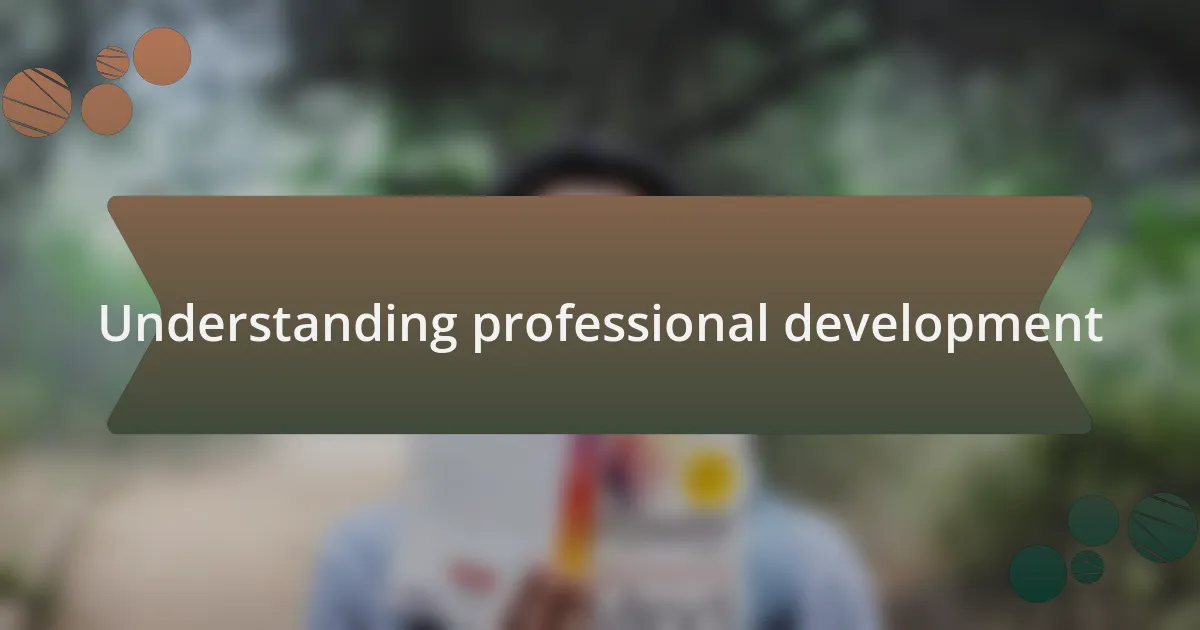
Understanding professional development
Understanding professional development goes beyond attending workshops or participating in trainings. For me, it’s about embracing opportunities for growth that challenge my thinking and push my boundaries. I remember a time when a simple peer feedback session opened my eyes to new strategies that I was previously unaware of; it was a reminder that learning is often most impactful when it’s collaborative.
When I think of professional development, I can’t help but reflect on the emotional journey tied to it. Feeling vulnerable in front of colleagues while sharing my classroom struggles was daunting, yet it created a profound sense of community. Have you ever felt that initial hesitation to share your experiences? Yet, in those moments, I found support and insight that transformed my approach to teaching.
Ultimately, understanding professional development means recognizing that it is a continuous process—one that evolves as we do. Just as we encourage students to take risks in their learning, we must also challenge ourselves to step outside our comfort zones. Why not dedicate time to seek out that next great resource or conversation that could ignite our passion for education? Each step we take contributes to a richer professional experience.
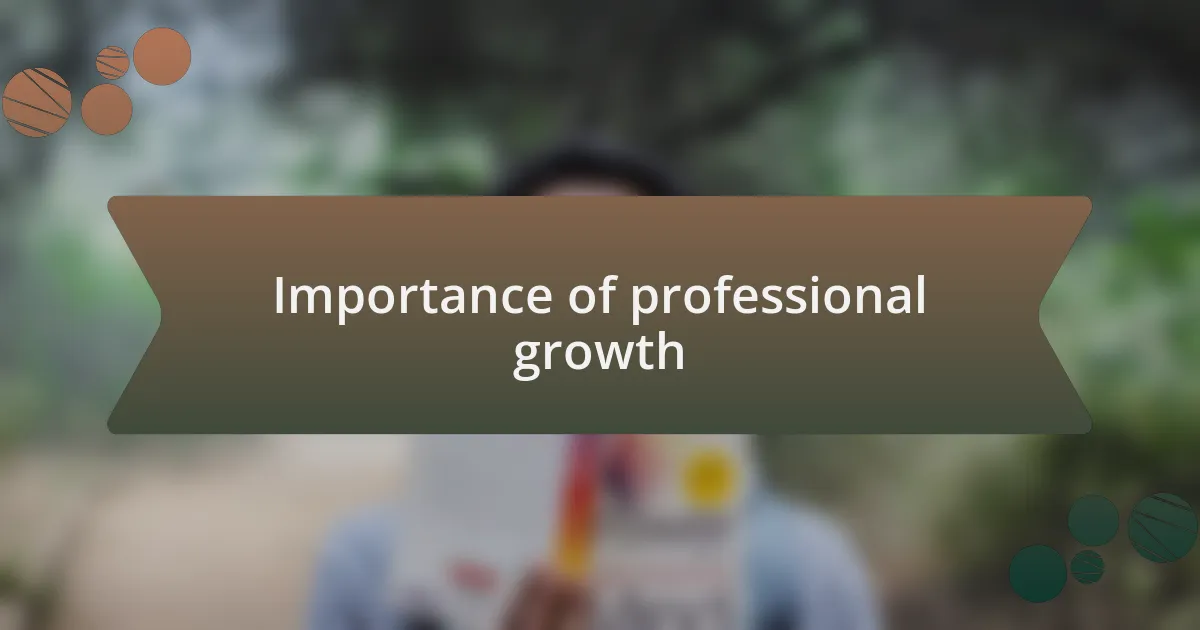
Importance of professional growth
Professional growth is essential because it equips us with the tools needed to adapt to the ever-evolving landscape of education. I remember attending a conference where I met a speaker who discussed the importance of incorporating technology into lesson plans. That moment was pivotal for me; I realized that staying current isn’t just beneficial; it’s necessary for engaging students effectively. How often do we find ourselves stagnating in outdated methods simply because we’re comfortable?
Moreover, professional development fosters resilience and confidence in our skills. I recall an instance when I attended a workshop on classroom management strategies that completely shifted my perspective. The feeling of empowerment as I tested those new strategies in my own classroom was exhilarating. It was a reminder that growth often comes from stepping outside our comfort zones. Wouldn’t it be great if every educator felt that sense of accomplishment regularly?
Investing in our own development also reverberates through our students’ experiences. When we grow, we inspire those around us—colleagues and students alike. I’ve noticed that my own enthusiasm for learning ignites similar passion in my students, encouraging them to take ownership of their educational journeys. Isn’t that what we strive for? Knowing that my growth directly influences my students’ success has been one of the most rewarding aspects of my career.
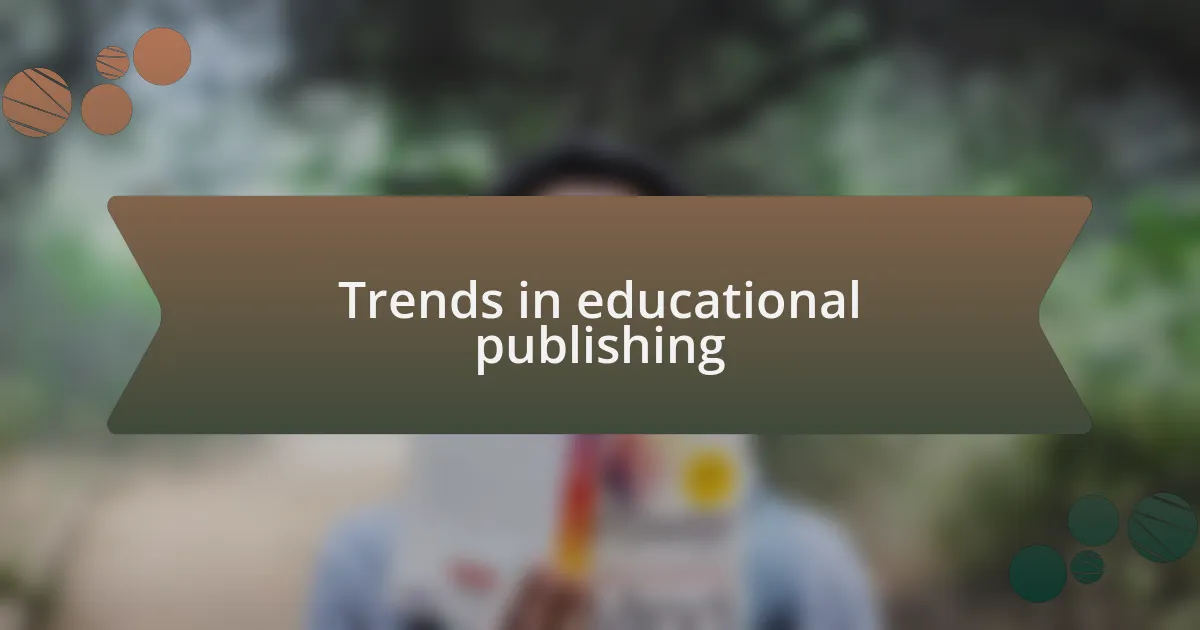
Trends in educational publishing
The landscape of educational publishing is increasingly leaning towards digital resources. I’ve observed a shift where more educators are opting for interactive e-books and online platforms rather than traditional print materials. This trend not only aligns with the needs of tech-savvy students but also allows for real-time updates—a crucial element when we’re trying to keep teaching materials relevant. Have you ever had to frantically sift through outdated textbooks right before a lesson?
Another significant trend is a growing emphasis on personalized learning materials. As someone who’s experimented with differentiated resources in my own teaching, I can attest to the value they bring. Providing students with tailored content based on their learning styles not only boosts engagement but also fosters a sense of ownership. It makes me wonder, how can we further harness technology to meet the individual needs of every learner?
Lastly, collaboration between educators and publishers is becoming more prominent. I remember working alongside a publishing team to develop resources that addressed the specific challenges faced in my classroom. This partnership approach means that the materials we use are not only practical but also informed by real classroom experiences. Doesn’t it make sense to create resources that genuinely reflect the voices of those who use them?
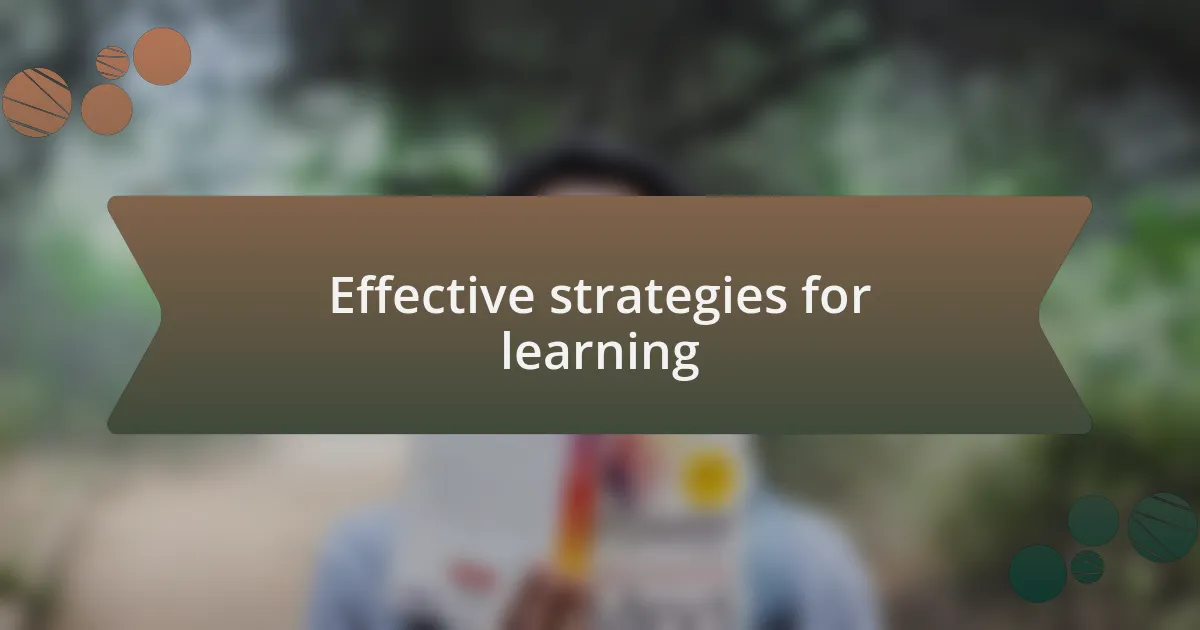
Effective strategies for learning
Effective strategies for learning often revolve around setting clear goals. In my experience, defining what I want to achieve not only helps me stay focused but also allows me to measure my progress. Have you ever noticed how motivating it is to tick off a completed task? That sense of accomplishment often drives me to tackle even more challenging learning objectives.
Active engagement is another cornerstone of effective learning. I’ve found that simply passively consuming information is rarely enough. When I actively engage with the material—whether through discussions, teaching others, or even creating visual aids—I absorb concepts much more deeply. It’s a game-changer, and I often wonder how many learners overlook this approach in favor of traditional methods.
Lastly, reflection plays a vital role in consolidating what I’ve learned. After I complete a course or project, I take time to consider what worked well and what didn’t. This practice not only enhances my understanding but also informs my future learning strategies. Have you tried reflecting on your learning experiences? The insights gained can be incredibly enlightening, revealing patterns that can guide your growth moving forward.
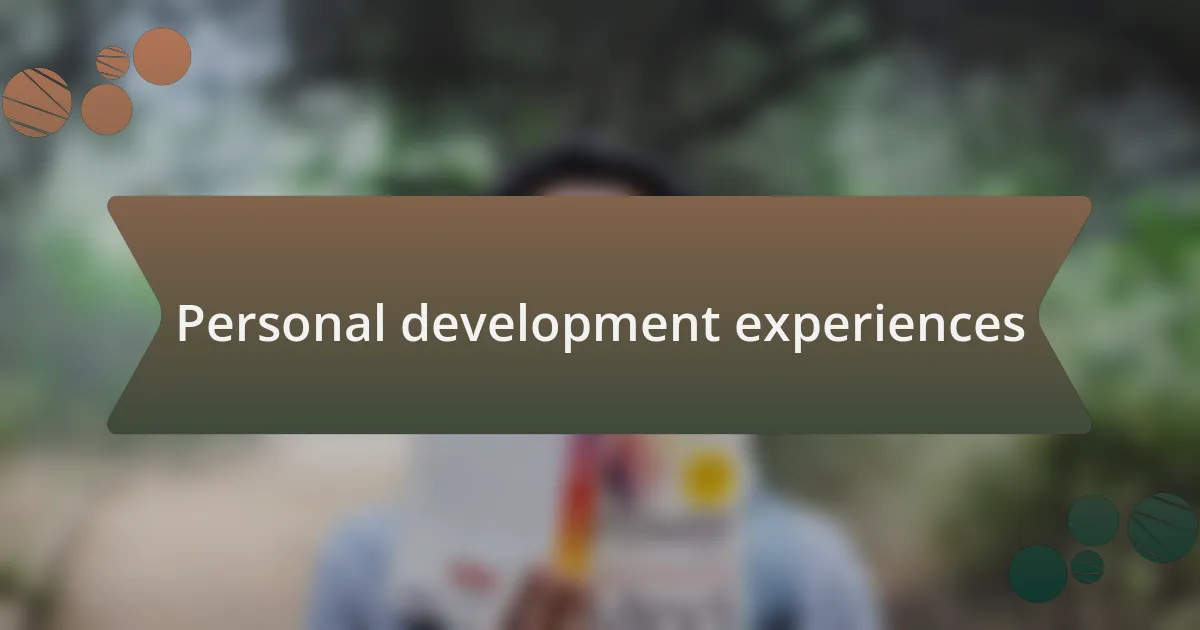
Personal development experiences
I remember one particular personal development experience that transformed my approach to learning. I decided to attend a workshop that focused on creative problem-solving techniques. The atmosphere was electric, and as we brainstormed as a group, I realized how collaborative discussions often spark ideas I never would have considered on my own. Has there been a time when you felt your creativity igniting in a group setting?
Another experience worth sharing happened during an online course I took. At first, I struggled with the material, feeling overwhelmed by the sheer volume of content. It wasn’t until I reached out to a study group that everything clicked. Collaborating with others not only provided new perspectives but also reinforced my understanding of difficult concepts. I wouldn’t have grasped the nuances of those topics without that sense of community. Have you ever thought about how interaction can make challenging material feel more accessible?
Finally, I find that taking time for personal reflection after engaging in professional development is invaluable. Once, after a particularly challenging series of training sessions, I sat down with a journal to unpack what resonated with me. This process allowed me to articulate my thoughts and emotions, leading to a deeper understanding of my personal growth. Do you regularly carve out time to reflect on your development experiences? The clarity and direction that come from this practice can be profound.
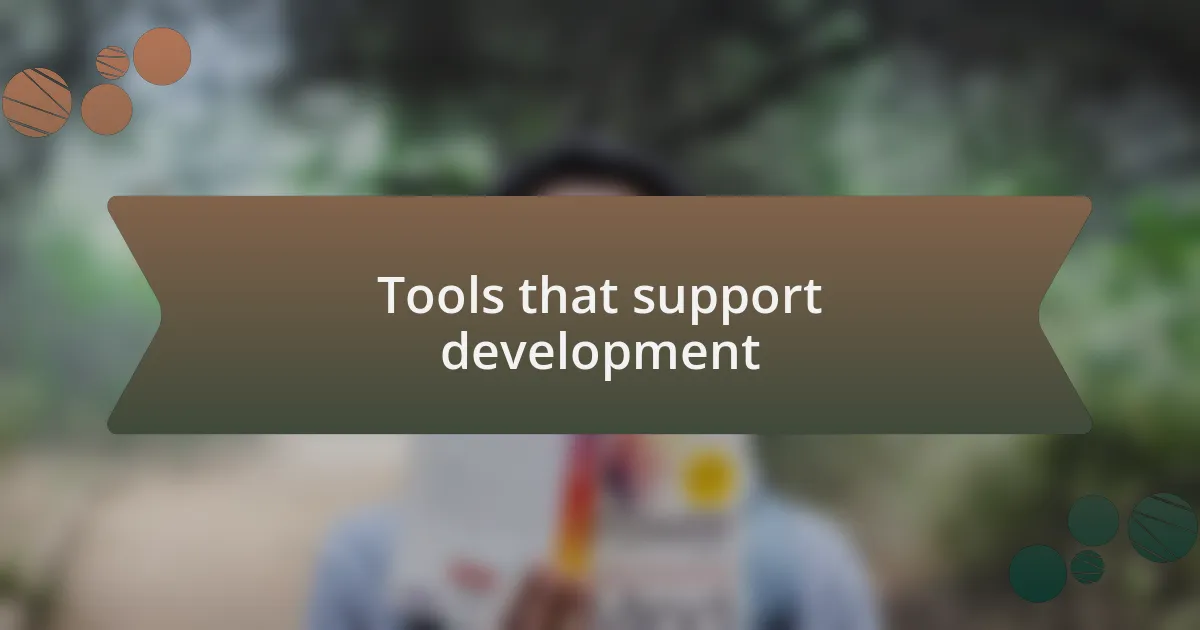
Tools that support development
There are several tools that have greatly enhanced my journey in professional development. One particular tool that stands out is a project management app I started using which organizes tasks and deadlines efficiently. I recall a period when deadlines felt overwhelming; using this tool not only helped me prioritize my work but also provided a sense of accomplishment as I checked off completed tasks. Have you ever experienced the satisfaction of visualizing your progress?
Moreover, I find that online platforms for professional development play a crucial role in my growth. I remember diving into a learning management system that offered interactive modules. The gamified elements made the experience enjoyable and encouraged me to engage consistently. How does a playful learning environment impact your motivation to develop new skills?
Another indispensable tool in my arsenal is a digital community forum. I joined one after realizing that learning doesn’t have to be a solitary pursuit. In this space, I share challenges and successes with peers, gaining insights that I might never have considered on my own. Have you ever found that discussing your struggles with others leads to unexpected solutions? This tool has transformed how I view personal development by turning it into a shared journey rather than a solo trek.
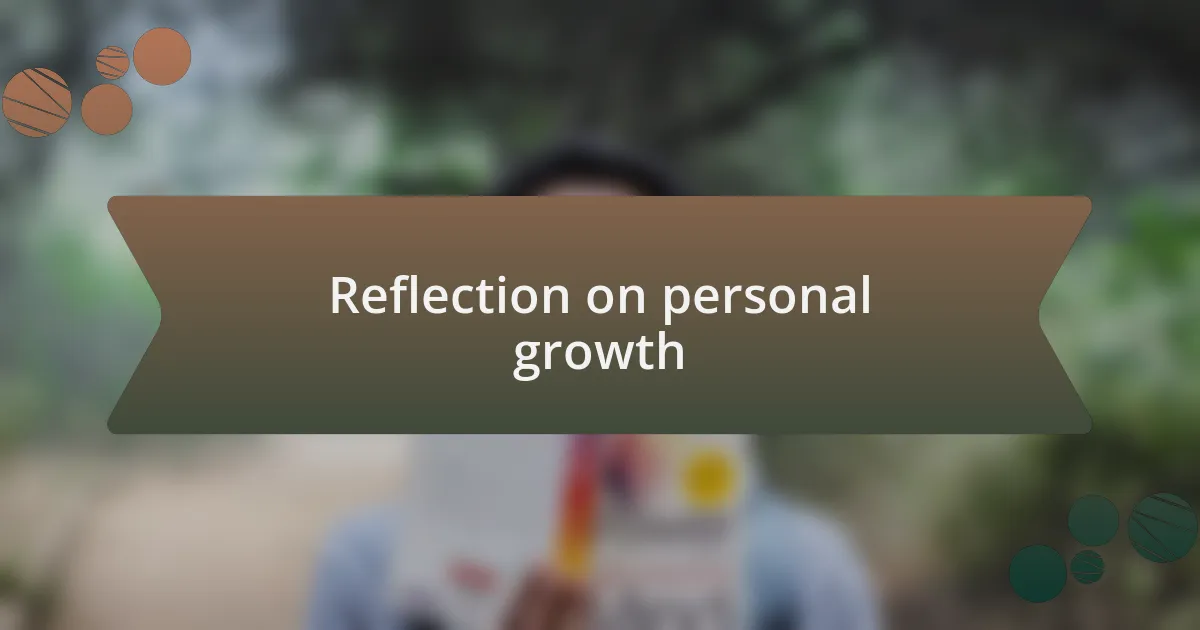
Reflection on personal growth
Reflecting on my personal growth often reveals how pivotal moments shape my professional journey. I remember a time when I hesitated to share my ideas in meetings, convinced they weren’t valuable. But after seeking feedback from a trusted colleague, I began to understand that my contributions were meaningful. Have you ever recognized your own voice as a powerful tool after overcoming self-doubt?
Another significant aspect of my growth has been embracing vulnerability. I recall a challenging project where I felt completely out of my depth. Instead of hiding my uncertainties, I chose to be open about them with my team. The support I received not only boosted my confidence but also fostered a collaborative environment. Doesn’t it feel reassuring when honesty paves the way for collective problem-solving?
A consistent practice of self-assessment has been transformational for me as well. At the end of each month, I take time to reflect on my achievements and setbacks. This practice allows me to set realistic goals for the future. I often ask myself, “What lessons can I draw from these experiences?” This simple question has led to significant insights that guide my approach moving forward, reminding me that growth is a continuous journey.